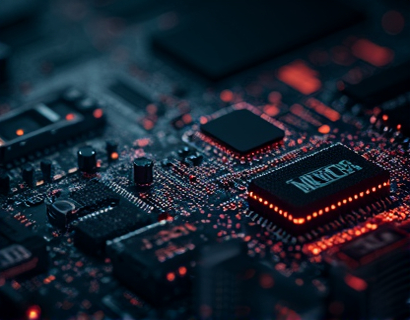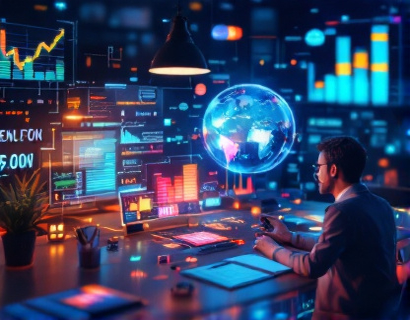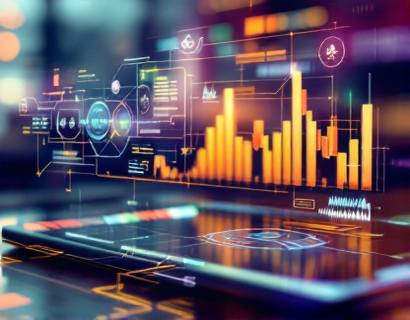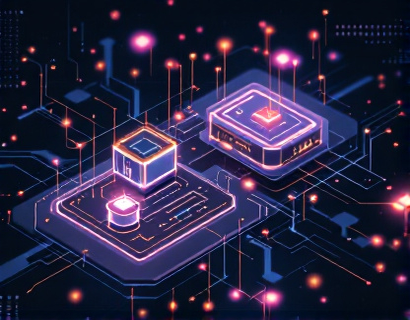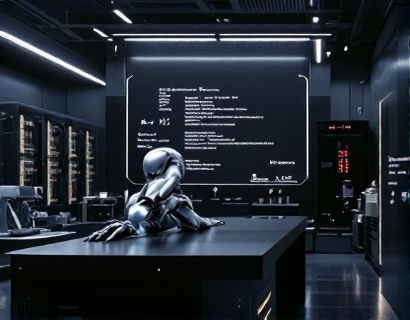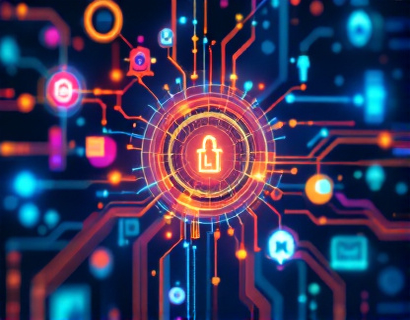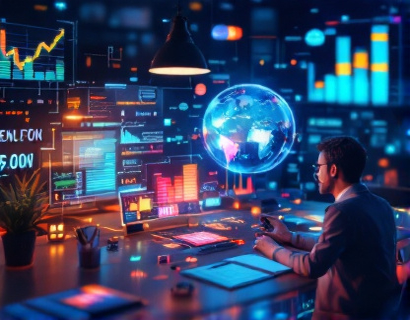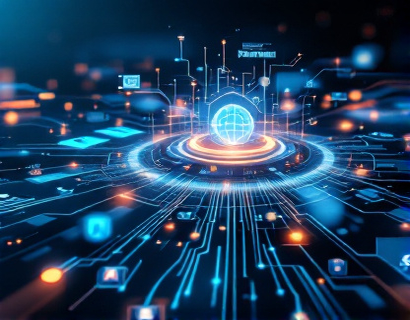Transforming Digital Productivity with Crypto and AI Integration
The digital age has ushered in a new era of technological advancements, where cryptocurrency and artificial intelligence (AI) are at the forefront of innovation. These two powerful technologies, when integrated, offer unprecedented opportunities to enhance productivity, streamline processes, and unlock new levels of efficiency. This article delves into the transformative potential of combining crypto and AI, providing a comprehensive guide to the latest tools and applications that can revolutionize the way tech professionals and enthusiasts approach digital tasks.
The intersection of cryptocurrency and AI is a fertile ground for developing cutting-edge solutions that not only improve individual productivity but also drive collective progress in the tech community. By leveraging the decentralized and secure nature of blockchain technology, coupled with the intelligent capabilities of AI, we can create systems that are more efficient, transparent, and user-friendly. This synergy is particularly beneficial for tech professionals who are constantly seeking ways to optimize their workflows and stay ahead in a rapidly evolving digital landscape.
Understanding Cryptocurrency and AI
To fully appreciate the impact of integrating cryptocurrency and AI, it's essential to understand the fundamental concepts of both technologies. Cryptocurrency, often referred to as digital or virtual currency, operates on a decentralized network known as blockchain. This technology ensures secure, transparent, and tamper-proof transactions without the need for intermediaries like banks. Bitcoin, Ethereum, and numerous altcoins are prime examples of cryptocurrencies that have gained widespread recognition and adoption.
Artificial intelligence, on the other hand, encompasses a range of technologies designed to simulate human intelligence in machines. These include machine learning, natural language processing, and computer vision. AI systems can analyze vast amounts of data, identify patterns, make predictions, and automate complex tasks, significantly enhancing productivity and decision-making processes.
The combination of these two technologies opens up new possibilities. For instance, smart contracts on the blockchain can be programmed to execute automatically when certain conditions are met, thanks to AI-driven algorithms that monitor and validate these conditions in real-time. This integration not only reduces the need for manual intervention but also minimizes the risk of errors and fraud.
Enhancing Productivity with Crypto and AI
One of the most significant ways crypto and AI can transform productivity is through the development of decentralized applications (dApps). Unlike traditional applications hosted on centralized servers, dApps run on blockchain networks, ensuring greater security and resilience. AI can enhance these applications by providing intelligent features such as personalized user experiences, predictive analytics, and automated task management.
For instance, a dApp designed for project management can use AI to analyze team performance, predict bottlenecks, and suggest optimal workflows. This not only streamlines the project lifecycle but also ensures that resources are utilized efficiently. The decentralized nature of the app means that all data is securely stored on the blockchain, accessible only to authorized users, thereby maintaining privacy and integrity.
Another area where crypto and AI intersect is in the realm of digital identity and access management. Traditional identity verification processes are often cumbersome and prone to security breaches. By leveraging blockchain for secure storage of identity data and AI for biometric verification, users can enjoy a seamless and secure authentication experience. This is particularly beneficial for remote workers and businesses that need to manage access to sensitive information and systems.
Optimizing Workflows with Smart Contracts
Smart contracts are self-executing contracts with the terms of the agreement directly written into code. When integrated with AI, smart contracts can become even more powerful tools for automating and optimizing workflows. For example, in supply chain management, smart contracts can automatically trigger payments once delivery is confirmed, thanks to AI-powered tracking and verification systems.
AI can also enhance the functionality of smart contracts by providing predictive insights. By analyzing historical data and current trends, AI algorithms can forecast potential issues and suggest preemptive actions. This proactive approach not only reduces delays but also ensures that processes run smoothly and efficiently. For businesses, this means reduced operational costs and increased reliability in their operations.
Data Analysis and Decision Making
The ability to analyze large datasets quickly and accurately is a game-changer in today's data-driven world. AI algorithms excel at processing and interpreting complex data, providing valuable insights that can inform strategic decisions. When combined with the transparency and security of blockchain, this capability becomes even more potent.
For instance, in finance, AI-driven analytics can monitor market trends, assess risks, and optimize investment strategies in real-time. By storing transaction data on a blockchain, all parties involved can access a tamper-proof record of all financial activities, ensuring transparency and trust. This integration not only enhances decision-making but also builds confidence among stakeholders.
In the field of healthcare, AI can analyze patient data to predict disease outbreaks and optimize treatment plans. Blockchain ensures that patient data is securely stored and shared only with authorized personnel, maintaining privacy while enabling collaborative and efficient care. This synergy between crypto and AI can lead to better health outcomes and more efficient healthcare systems.
Enhancing User Experiences through Personalization
Personalization is key to enhancing user experiences in the digital age. AI algorithms can analyze user behavior, preferences, and interactions to deliver tailored content and services. When integrated with blockchain, this personalization can be done securely and privately, without compromising user data.
A practical example is in the realm of content streaming services. AI can recommend shows and movies based on viewing history and preferences, while blockchain ensures that content licenses are managed securely and transparently. Users can enjoy a personalized experience without worrying about data breaches or unauthorized access.
Moreover, blockchain-based loyalty programs can reward users for their engagement and purchases, with AI optimizing the reward system based on user behavior. This not only increases customer satisfaction but also fosters loyalty and repeat business.
Challenges and Considerations
While the integration of cryptocurrency and AI offers numerous benefits, it is essential to acknowledge the challenges and considerations involved. One of the primary concerns is the regulatory landscape. As both crypto and AI technologies evolve, regulatory frameworks are still catching up, leading to uncertainties and potential legal risks. It is crucial for organizations and individuals to stay informed about regulatory changes and ensure compliance.
Another challenge is the technical complexity involved in integrating these technologies. Developing robust and secure systems requires expertise in both blockchain and AI. Organizations may need to invest in training their teams or partner with specialized firms to navigate this complex landscape effectively.
Additionally, there is the issue of scalability. While blockchain and AI offer powerful solutions, scaling these technologies to handle large volumes of data and transactions can be challenging. Continuous research and development are necessary to overcome these hurdles and make these technologies more accessible and efficient.
Future Prospects
The future of crypto and AI integration holds immense potential. As technology advances, we can expect more sophisticated and seamless integrations that further enhance productivity and innovation. The development of interoperable blockchain platforms will enable different systems to communicate and work together more effectively, expanding the possibilities for AI-driven applications.
Moreover, the rise of decentralized finance (DeFi) and non-fungible tokens (NFTs) demonstrates the growing importance of blockchain in various sectors. AI can play a pivotal role in optimizing DeFi protocols and managing NFT collections, opening new avenues for investment and creativity. The synergy between crypto and AI will continue to drive innovation, leading to more efficient, secure, and user-centric digital solutions.
In conclusion, the integration of cryptocurrency and AI represents a transformative force in the digital age. By leveraging these technologies, tech professionals and enthusiasts can unlock new levels of productivity, security, and innovation. As we move forward, embracing this synergy will be essential for staying competitive and relevant in an increasingly digital world.




